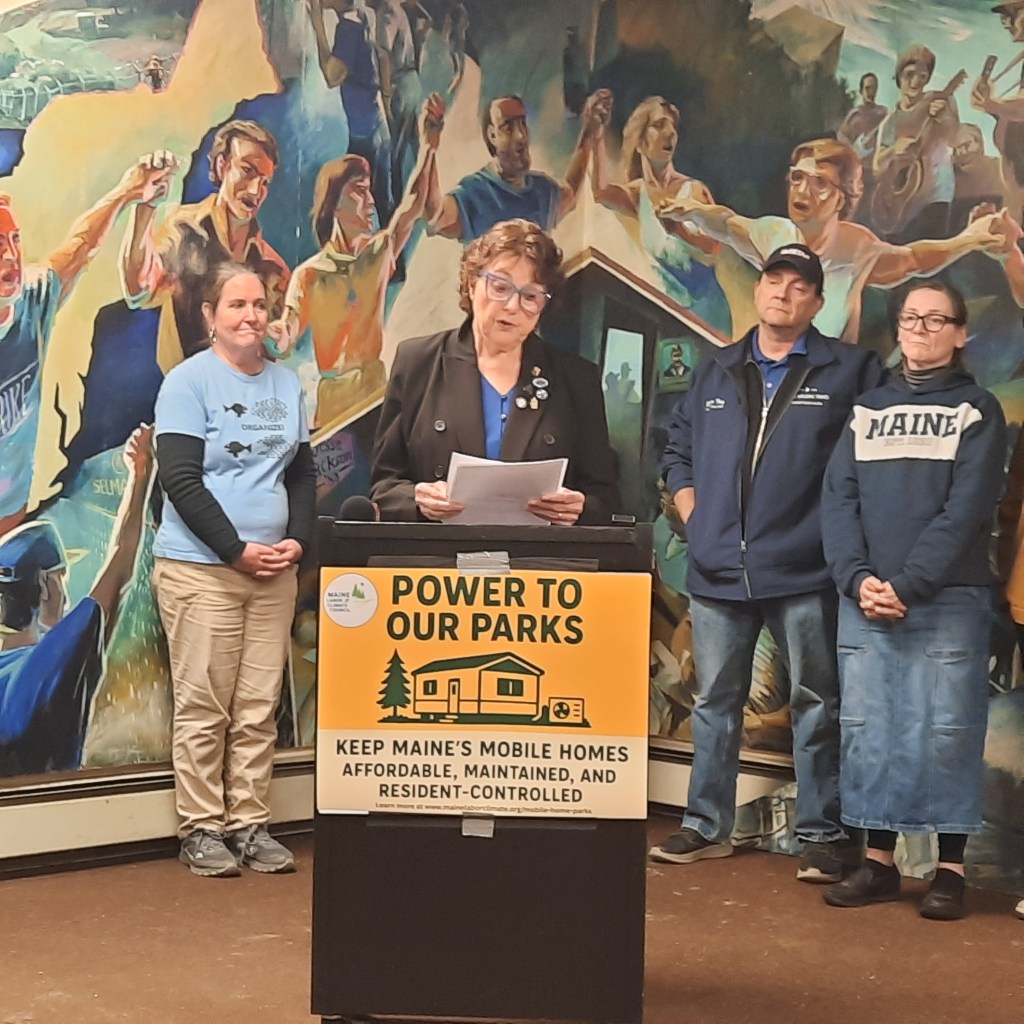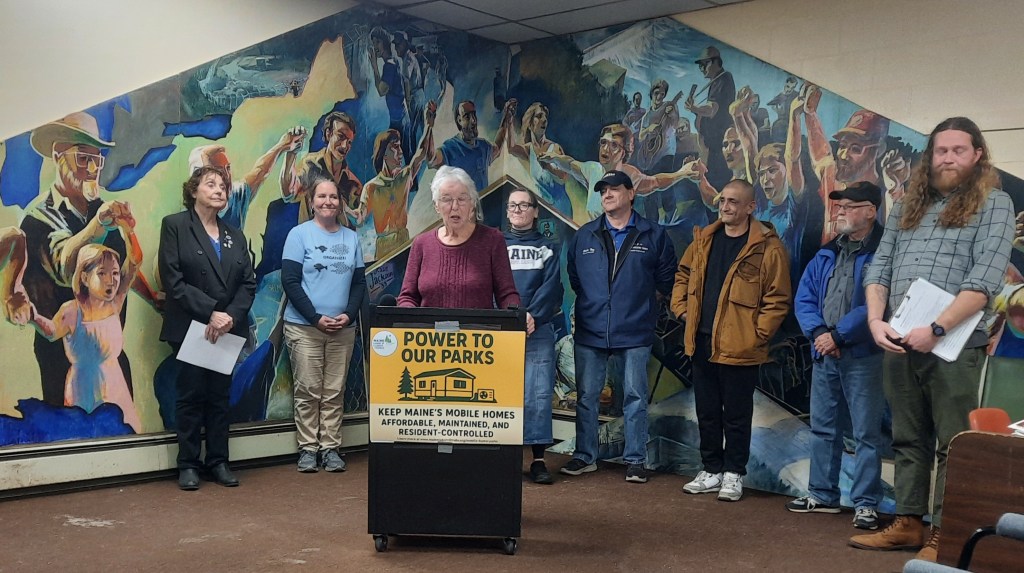
JAY — The Jay Select Board voted Monday to consult its attorney on whether the town can enact a moratorium on mobile home lot rent increases.
The move followed a news conference where residents urged officials to adopt a stabilization ordinance.
Last spring, the Maine Legislature approved two bills aimed at strengthening protections for mobile home park residents. One law gives residents a “right of first refusal” when their parks go up for sale, allowing them the opportunity to purchase the property before it is sold to outside buyers. The same legislation also created a permanent fund to help resident cooperatives finance park purchases, giving communities greater control over future rent increases and long-term management.
Another new law, originally proposed as a statewide cap on rent increases, instead directed the state to develop a sample rent stabilization ordinance that municipalities can adopt. The law also established a state working group to study the long-term affordability of mobile home parks as rising rents and investor purchases continue to reshape the sector across Maine.
Residents from Pine Haven, Lambert Street and Hidden Circle parks gathered at the Local 14 Solidarity Center at 4:30 p.m. to describe repeated rent increases and long-standing maintenance problems they say are putting seniors and low-income families at risk of displacement. The Select Board meeting followed at 6 p.m.
In an email Monday, Cheyenne Gallivan, communications and member engagement director for the Maine Labor Climate Council, said residents have faced “repeated lot rent increases and long-standing maintenance problems,” including backed-up septic systems, dangerous trees, poor drainage and inadequate snow removal. With winter approaching, Gallivan said “residents felt an urgent need for the Town of Jay to take action.”
Gallivan said increases of $25-$50 have occurred “often without warning,” creating financial strain for residents living on fixed incomes.
She also confirmed that Hidden Circle residents formed a cooperative and submitted an offer to purchase their park, calling it “a major step that highlights both the need and the possibility for resident control.” The Maine Labor Climate Council and the Cooperative Development Institute have supported residents with meetings, communications, and the petition and voting process, she wrote, adding, “Residents are leading the effort.”
At the news conference, residents and supporters described deteriorating conditions and rising costs.

Lambert Street resident Joann Gray, 82, said she bought her mobile home after selling her stick-built house at age 70.
“I have lived in Jay my whole life,” she said. After the park was sold, she said, “it was all downhill after that.” Roads are in poor condition, dead trees hang over homes and she fears another increase after October’s $50 hike.
“I know there are people in that park barely skimping by,” she said.
“We are asking for a rent cap or moratorium on the park that will keep the lot rate stabilized,” Gray said. She added that when you enter Maine, “there is a big sign down there in Kittery that says ‘Maine, the way life should be.’ They should put one more sentence on the bottom of that and put ‘the state of Maine is not for sale.'”
Gubernatorial candidate Troy Jackson, a fifth-generation logger from Allagash, said “the status quo just isn’t working for folks.” He told residents that working families are being priced out while “Wall Street billionaires are buying up our communities.” Jackson described growing up in a trailer and worrying about heat.
“What is going on tonight is not fair,” he said. “Now is the time for action. It starts tonight at the meeting.”
Western Maine Labor Council President Linda Deane said mobile home parks statewide are being purchased by investors while fees rise beyond what residents can afford. If rent hikes continue, she said, “many residents will be pushed out of their homes.” A stabilization ordinance is “not extreme,” she said. “It is reasonable and it is humane and gives the town stability.”
Board discussion turns to legal authority, timeline
At the Select Board meeting, Town Manager Shiloh LaFreniere outlined the available paths but emphasized uncertainty about what the Select Board is legally allowed to do.
“It is unique for Jay, a select board town government, not council form of government,” she said. “We have checked with other towns, conferred with (Maine Municipal Association) a little bit.”
One option is a moratorium, described as a “rent freeze” while an ordinance is developed. But LaFreniere said it is not yet clear whether the Select Board can enact a moratorium or whether voter approval is required. Another option is to place an ordinance before voters at the April town meeting.
She noted that the state is working on a model ordinance. To meet the April town meeting timeline, she said, “it has to be fully drafted by February.” She cited Old Orchard Beach’s ordinance, which allows rent increases up to 5% unless the owner demonstrates a justified need for a higher amount.
LaFreniere confirmed earlier that New Riverside Farms of Holmes Beach, Florida, owns Pine Haven, Lambert Street and Hidden Circle parks, with property management overseen by RCM Property Management. She said the plumbing inspector has received calls regarding systems in Hidden Circle but she was not aware of other formal complaints.
The issue reached the board after Maine Labor Climate Council Field Director Joe Hupperich, Nora Gosselin from the Cooperative Development Institute and a Lambert Street resident contacted the town to discuss rent conditions and co-op efforts, LaFreniere said.
LaFreniere emphasized that any proposal would apply to “just the lot rentals.” The residents own the homes, not the land.
LaFreniere asked the board how it wished to proceed. Board members said they needed legal clarity about the town’s authority before considering any next step.
A motion was made for LaFreniere to “engage with the town’s attorney regarding the moratorium and what it would require of us (the board).” The board voted unanimously in favor, drawing applause from residents.
In her email earlier Monday, Gallivan said residents will “continue organizing and exploring every option available” if the board chooses not to act.
“Residents are committed to protecting their homes and they will not stop,” she wrote.

We invite you to add your comments. We encourage a thoughtful exchange of ideas and information on this website. By joining the conversation, you are agreeing to our commenting policy and terms of use. More information is found on our FAQs. You can modify your screen name here.
Comments are managed by our staff during regular business hours Monday through Friday as well as limited hours on Saturday and Sunday. Comments held for moderation outside of those hours may take longer to approve.
Join the Conversation
Please sign into your CentralMaine.com account to participate in conversations below. If you do not have an account, you can register or subscribe. Questions? Please see our FAQs.